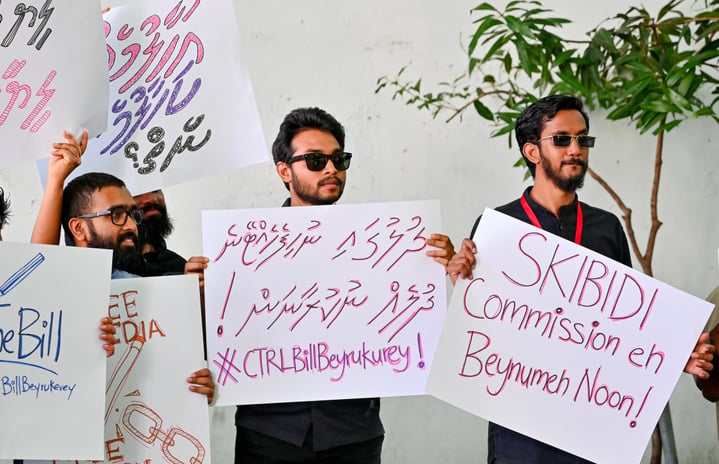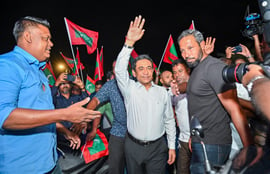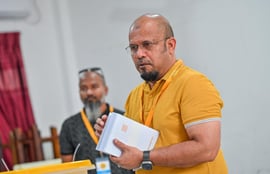Various media organizations have been asked to attend a committee to discuss the Media Regulation Bill which was submitted by Thulhaadhoo MP Abdul Hannan AbuBakuru.
The decision to pass the bill came as journalists protested near the parliament since the beginning of the sitting, calling for the withdrawal of the bill. Work has already begun regarding the committee as the bill was passed yesterday.
During today's meeting of the Committee on Independent Institutions, it has been decided various registered media, Maldives Media Council (MMC), Maldives Broadcasting Commission, Human Rights Commission and Youth Ministry will be called upon to the committee for discussions regarding the matter.
Journalists protested outside the President's Office and Mulee-Aage as the bill was accepted, with some journalists having been arrested but released without much time having passed. Journalists continue to express their disapproval over the hasty process in passing the bill.
During last night's MMC press conference, it was expressed that the bill would not only disrupt Maldivian journalism, it would set journalism in the country back many years.
Journalists are also signing a petition opposing the bill. The petition raises concerns that the bill narrows down press freedoms guaranteed in the Constitution. Journalists are calling for the rejection of the bill, rather than amendments being made during the committee's review stage.
Senior journalists are also saying that freedom of press will be lost if the bill goes through.
Concerns about the bill
- The inclusion of the three members who will be appointed by the President, is an action that will not only throw away the "best practices" systems that are observed worldwide in journalism, but will also throw away the self regulatory system, with the government's influence making its way into the media.
- Parliament will have the power to remove members voted and appointed by journalists. Due to this, the Parliament and government can influence journalists' chosen individual.
- Including upholding elected governments amongst the code of ethics for journalism. Due to an article such as this being included, it will be a difficult task for journalists to hold the government accountable and responsible.
- While a case is being reviewed by the commission, the power to temporarily seize licenses will be given to the council, along with the targeted closure of news organizations for an undisclosed amount of time: The power to invalidate the license will be given to the court as is stated in the article, with the power to temporarily invalidate the license given to the commission, making this rule something that doesn't make any sense.
- The commission will have the power to bring down the police onto the offices of news and television organizations should they "deem" a situation as a danger to the security of the nation. National security can be defined very broadly.
- As action can be taken against individual journalists, the disclosure of information to journalists and responsibility to the work will be hindered, keeping journalists in a state of constant fear. The current system does not allow action to be taken against individual journalists.
- It is not known who determines the "truth" or the "falsity" of an incorrect claim, when it says you must apologize if you reveal incorrect information.




